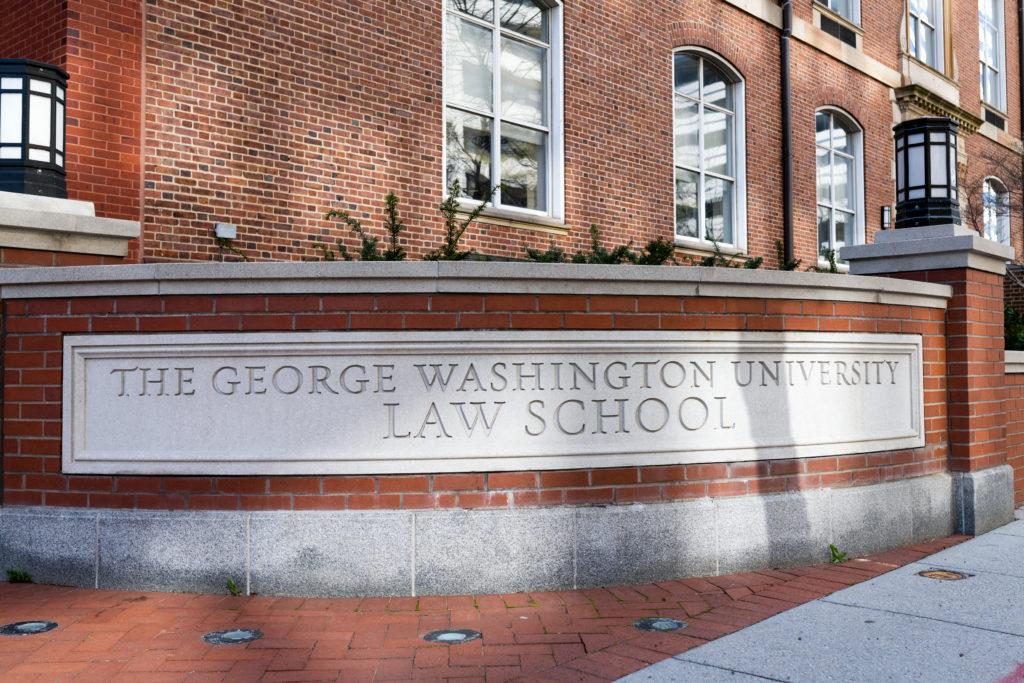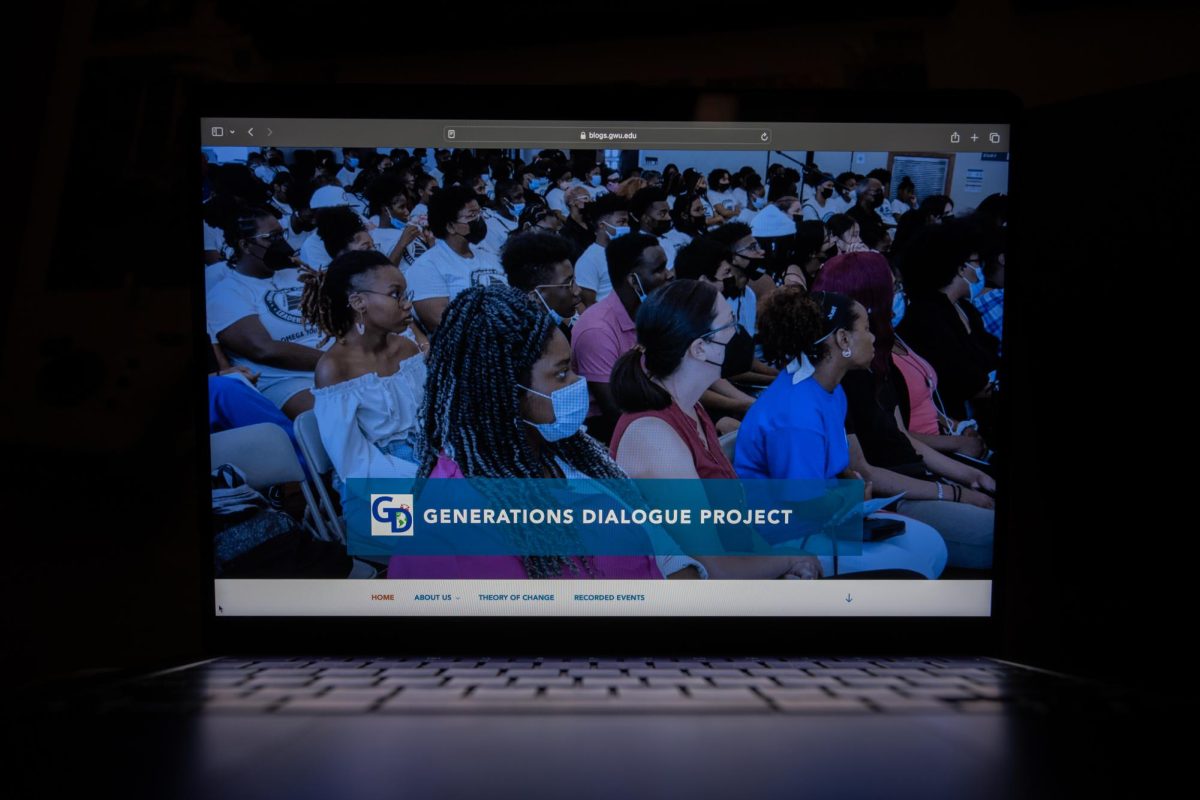After passing an anti-racism resolution this summer, GW Law officials said they have diversified course readings, encouraged faculty to attend bias training and held discussions on racial justice issues for GW community members.
The resolution included initiatives to increase the number of non-White faculty and staff at the law school, improve efforts to recruit students of color and implement workshops on race-sensitive teaching. Law school Dean Dayna Bowen Matthew said her office has been working with students, faculty and staff to address the initiatives from the resolution through speaking events and fundraising efforts for social justice organizations.
Matthew said officials implemented a speaker series on racial injustice for law school members called “Visions of Change” as a “scholarly discourse” on the role of race in health care, criminal law, commercial law and civil justice. She said officials have held two “pop-up” discussions that focus on current issues like the legal implications of the grand jury’s decision in the case of Breonna Taylor.
“The resolution reaches every aspect of our academic, intellectual and professional mission, and we are identifying immediate, medium- and long-term actions for implementing the resolution,” Matthew said in an email.
She said her office is raising funds to establish a national institute of racial and socioeconomic equity; Power Reimagined, an institute for women, race and law; and a health justice initiative. Matthew said officials are working to establish a “new point of contact” in her office for matters of diversity, equity and inclusion.
Matthew said “numerous” faculty have begun revising their syllabi and “pedagogical approaches” to accomplish the initiatives in the resolution, adding that her office is working with a teaching committee to explore further ways to support those efforts.
“Moreover, several faculty members have proposed new courses that will squarely address issues of race in America, and the Dean’s Office is prioritizing such courses as it evaluates the law school’s academic offerings going forward,” she said.
She said the law school’s Career Center, Dean of Students Office and admissions office are working to ensure the school’s incoming classes are “as diverse as possible” and those students are supported and able to successfully launch their careers. She did not specify how the offices are trying to diversify future classes.
Matthew said her office is planning an “administrative role” to lead the law school’s diversity and inclusion responsibilities and will announce the details about this role by early 2021. She said this role is a “priority” even in light of the University’s budget shortfall.
“The law school is proud that the faculty unanimously adopted an anti-racism resolution on June 19, 2020, and since that time students, faculty and staff have been eager to pursue actions that will follow through on that commitment,” Matthew said.
She declined to say if officials have plans to expand the efforts listed in the resolution.
Sonia Suter, a research professor of law, said she and 10 other law professors helped create the resolution following a letter signed by more than 50 faculty members condemning Attorney General William Barr as not abiding by the basic values of the law school.
Suter said faculty saw there was a “larger issue” of racial justice that “transcended” Barr’s actions, which she said motivated them to draft and pass the resolution.
She said law school officials are hosting a series of discussions on racial justice and encouraging students and faculty to undergo bias trainings. She said in light of the hiring freeze administrators implemented in March to mitigate the financial impact of the COVID-19 pandemic, officials have not been able to make progress in hiring more people of color in the school.
The resolution stated that officials will work with the Black Law Students Association to implement the school’s goals. Suter said faculty want to encourage BLSA to engage and collaborate with them on these issues but don’t want students in BLSA “to feel like it’s their job” to work on these issues.
“We were trying to strike a really fine line between making it clear we were interested in the views of student organizations generally, but especially student organizations who are impacted by racism, and making it clear we didn’t want to expect BLSA and other groups to hold our hands and take us through this process,” she said.
BLSA members said the resolution assured Black students that law school officials were listening and willing to work with BLSA on their concerns but said the resolution lacked action items and “concrete” steps to move forward.
Jordan Jean, a social action chair of BLSA, said members of BLSA’s executive board met with Emily Hammond, the law school’s senior associate dean for academic affairs, last week to discuss how the initiatives were being implemented and set up a monthly check-in meeting.
Jean said the resolution was a step in the right direction, but “it’s not the ceiling, it’s the floor.” He said BLSA will continue to assess the progress of the resolution as the year progresses, and he wants to see faculty pass another resolution with concrete steps that he said were lacking from the original resolution.
He added that officials gave “some type of inclination” that they heard BLSA’s frustrations and desire for transparency in implementing anti-racism initiatives.
“Dean Matthew at the helm of this thing will ensure that the law school becomes a place of diversity of thought, learning and that African-American students and people of the Black diaspora feel welcome and feel heard,” he said.
Katrina Jackson, another social action chair of BLSA, said BLSA will be able to “apply pressure and accountability” to law school officials through their scheduled monthly meetings.
“While we are optimistic, we are realistic in the sense that a lot of students of color have been told things, have been fed the diversity and inclusion line their whole academic career, and some have seen it and some have not,” she said.
Jackson said BLSA declined to sign on to the original resolution because it lacked “actionable items.”
BLSA launched a petition in July calling for equity and institutional change at the law school, which Jackson said was not connected to the resolution that faculty passed. She said officials were “open and welcoming” to conversations about the petition.
“Given a variety of factors, certain things are going to take some time right now,” she said. “Personally, I think it’s too soon to say how committed the law school is in ensuring a race-conscious and unbiased environment.”







